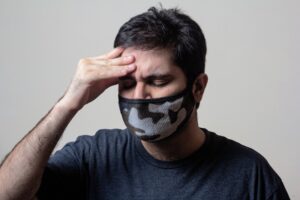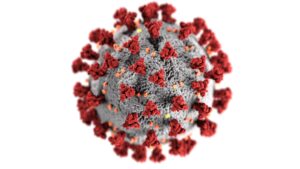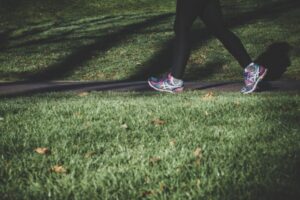COVID-19, Dizziness & Vertigo – What’s the link, and what to do?
We have all been living with COVID-19 since March 2019. In the time since then, what we know about the virus, its method of transmission and symptoms has been changing, seemingly day to day. Initially, we were told that the hallmark symptoms of COVID-19 infection were loss of smell or taste, along with typical respiratory virus symptoms (cough, congestion, etc.). Anecdotally, here in the clinic we have been hearing reports of dizziness and vertigo after COVID-19 infection. Is there any truth to this, or is it a simple coincidence? 
Prevalence of Vertigo & Dizziness
As time goes on, we are learning more and more about what symptoms COVID-19 can cause. Several studies across the world have investigated exactly this. While rates vary, studies from across the world have noted vertigo and dizziness as symptoms of COVID-19. Depending on the source, from 8-30% of people surveyed with COVID1-9 reported vertigo or dizziness as a symptom of infection. Considering the overall prevalence of COVID-19 infections across the world, this represents an enormous amount of people suffering from these symptoms.
COVID-19 Infection and Dizziness or Vertigo – A Potential Mechanism
 Some of the most common causes of vertigo and dizziness are labyrinthitis and vestibular neuritis. Labyrinthitis is an inflammation of the membranous labyrinth of the inner ear, while vestibular neuritis is an inflammation of the vestibular portion of the 8th cranial nerve. Both conditions are thought to be caused by viruses, specifically infection with upper respiratory tract infections ,. While we don’t know the exact mechanism by which COVID-19 causes vertigo and dizziness, as a known respiratory tract infection, it stands to reason that COVID-19 could cause neuritis and labyrinthitis in the same way as other upper respiratory tract infections.
Some of the most common causes of vertigo and dizziness are labyrinthitis and vestibular neuritis. Labyrinthitis is an inflammation of the membranous labyrinth of the inner ear, while vestibular neuritis is an inflammation of the vestibular portion of the 8th cranial nerve. Both conditions are thought to be caused by viruses, specifically infection with upper respiratory tract infections ,. While we don’t know the exact mechanism by which COVID-19 causes vertigo and dizziness, as a known respiratory tract infection, it stands to reason that COVID-19 could cause neuritis and labyrinthitis in the same way as other upper respiratory tract infections.
Symptoms – What our clients are reporting
What symptoms have we heard about from our clients after COVID-19 infection? Basically, we have heard reports of symptoms consistent with BPPV, spinning vertigo, as well as symptoms consistent with vestibular neuritis or labyrinthitis: spinning vertigo followed by feelings of dizziness, imbalance and gait disturbance, with or without tinnitus or hearing loss. There have also been published case reports of spinning vertigo as a feature of COVID-19 infection. Dizziness and vertigo have also been reported as a feature of long COVID, but there are few publications on this topic to date.
Treatment for COVID-19 related vestibular disorders
While there are no specific treatment guidelines to date for dizziness and vertigo due to COVID-19 infection, here are some general tips for managing COVID-related dizziness and vertigo that are based on best-practice guidelines for other vestibular disorders:
- Remain active! The cornerstone of vestibular rehabilitation is movement. Getting outside of the house to take a short walk, and expose yourself to movement and visual stimulation is one of the best ways to strengthen the vestibular system.

- Are you experiencing symptoms consistent with BPPV? Get it treated! BPPV is characterised by spinning vertigo experienced following position changes (lying down or rolling in bed). If you’re experiencing BPPV, canalith repositioning manoeuvres can be taught to you by a qualified vestibular physiotherapist, and can take care of your problem.
- Do some exercises! If you are feeling off-kilter, doing simple balance exercises like standing with feet together or in a tandem position, as well as gaze stability exercises like practising fixing a point with the eyes and moving the head side to side can help.
- See your physician! Some people with vertigo and dizziness related to COVID-19 require medication, which can be prescribed by your family doctor or ENT. In some cases, your physician may decide to investigate your dizziness with specific tests.
- Consult a trained vestibular physiotherapist! Vestibular physiotherapists can create a personalised exercise and treatment program that is specific to your symptoms, needs and objectives. We can help you get back to normal safely.
Next Steps
Vestibular physiotherapists are used to working with clients who have dizziness and vertigo symptoms of unknown origin, as for many people with vestibular disorders, the road to diagnosis can be very long. The knowledge that we have relating to post-COVID symptoms and long-COVID symptoms is evolving week by week. Until we have more robust data, it makes sense to treat COVID related vertigo and dizziness according to the proven principles of vestibular rehabilitation that we apply to other causes of these same symptoms.
What is important to note is that if you are having these symptoms, we believe you, and we can help you get better. The trained vestibular therapists on our team can accurately assess you, and get you on a path to recovery.

